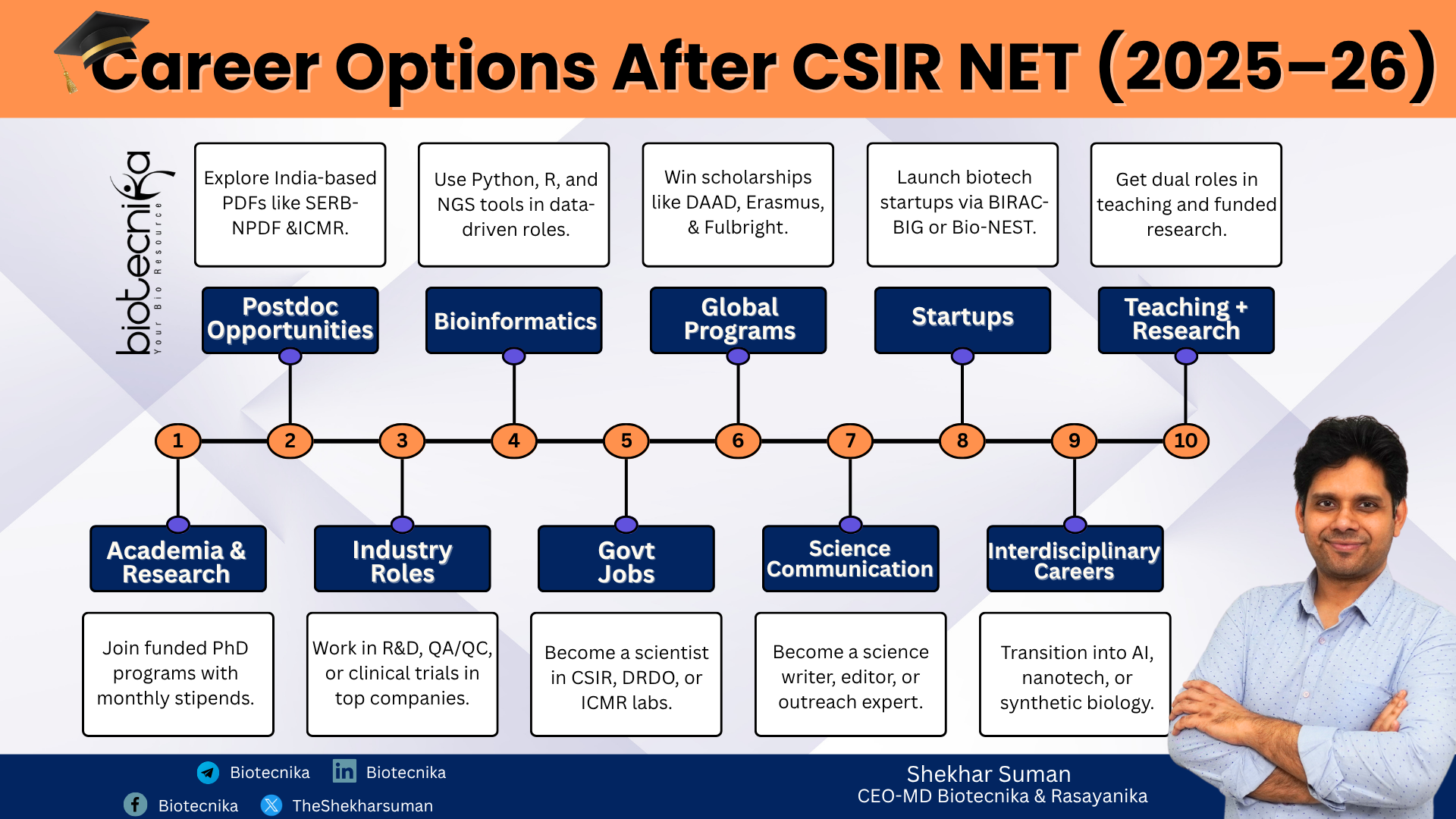New Career Paths After Qualifying CSIR NET in 2025–26
You have worked hard, cleared the country’s most challenging exam, or you are just a step away. We all know how important the CSIR NET Life Sciences exam is for life sciences. But have you ever thought about what you can really do with this qualification in today’s world?
Gone are the days when CSIR NET meant only two choices: PhD or teaching. In 2025 – 26, life sciences is one of the fastest-growing and most dynamic sectors in India and globally. And your degree with a CSIR NET qualification is more powerful than ever before.
You are not limited to traditional paths anymore. The world after qualifying CSIR NET is wide open. From working in AI-powered drug discovery and genome editing labs to entering regulatory affairs or even becoming a science communicator, you now have access to a wide spectrum of impactful, future-ready careers.
In this article, we will uncover the new career paths after qualifying CSIR NET for a life science graduate. You’ll discover:
- Exciting academic and industry roles that didn’t exist a few years ago
- Global opportunities in research, policy, and innovation
- How your NET qualification can launch a career in data-driven biology, science diplomacy, or biotech startups
- And how to choose the best path forward based on your passion and skills
So, whether your goal is research, recognition, or revolution, this article will be your roadmap to what’s next.
1. Career Option After CSIR NET: Academia & Research
Let’s begin with the most well-known career path in academia. If you have cleared the JRF (Junior Research Fellowship), you are eligible for a funded PhD program in India. In 2025, the stipend of a JRF selected through CSIR- National Eligibility Test (NET) will be Rs. ₹37,000 per month for the first two years. And it increases to ₹42,000 after PhD registration is confirmed.
You will often have an added advantage in entrance tests and job interviews with the CSIR NET. Many top research institutions of the country, including IISc, IITs, and CSIR labs, prefer NET JRF-qualified candidates. Beyond CSIR, you have fellowships like DST-INSPIRE, DBT-JRF, and the prestigious PMRF (Prime Minister’s Research Fellowship) that offer a wide range of opportunities with higher stipends and exposure to top-notch research facilities.
If you are someone who is passionate about teaching, then NET-LS (Lectureship) makes you eligible for an Assistant Professor job in colleges and universities. You can also combine research and teaching, securing the best of both worlds.
2. New Trends: Postdoctoral Fellowships in India and Abroad
After you have completed your PhD, you can explore several postdoctoral fellowships. These fellowships, along with funding, also allow you to gain specialized experience.
To begin your career as a researcher in India, several prestigious initiatives such as the ICMR Centenary-Postdoc Fellowship, SERB-National PDF, and DST-Ramanujan Fellowship will support you. These programs offer competitive salaries and freedom to conduct research independently.
And if you are looking for opportunities abroad, then you must apply to organizations like the European Molecular Biology Organization (EMBO) in Europe and the Japan Society for the Promotion of Science (JSPS) in Japan. The organizations are known for their highly respected fellowships and support for scientific research.
There are also Fulbright and Commonwealth schemes for postdocs and collaborative research. What’s exciting is that these global programs recognize CSIR-NET-qualified students as competitive applicants.
CSIR NET Lakshya Extension Batch 2025-26 Admissions
New Batch STARTS 08th Sept 2025
Prepare for the Unified CSIR & DBT Exam Syllabus
Prepare & Succeed With Biotecnika
3. R&D Roles in Biotech and Pharma
With India’s tech sector has crossed 10,000 startups by 2024, due this we have seen a rapid growth in the industry. The demand for skilled researchers has increased like never before. NET-qualified life science graduates are highly sought after in biotech companies, pharma firms, and clinical research organizations.
Top Career Options After CSIR NET:
- R&D Scientist
- Regulatory Affairs Associate
- Quality Control Analyst
- Clinical Research Associate
- Drug Safety Executive
Top Employers in Biotech and Pharma
- Biocon
- Dr. Reddy’s Laboratories
- Sun Pharmaceutical Industries
- Cipla
- Syngene
These companies are often known for their research and pipeline, especially in drug development, vaccine research, and diagnostics.
4. Rise of Bioinformatics and Computational Biology
The digital advancement is rewriting the future of biology. If you enjoy coding or data analysis, then bioinformatics is your true calling. As genome sequencing becomes mainstream, biotech companies need biologists who can make sense of the large, complex data.
Firms such as Strand Life Sciences, MedGenome, and Genotypic Technology are looking for life science graduates with analytical skills. Along with the CSIR NET qualification, you can boost your resume by learning Python, R, and other bioinformatics tools. With these tools and qualifications, you can work in:
- Genome data analysis
- Systems biology
- AI-driven drug discovery
This is an excellent path for students who want to blend biology with technology and innovation.
5. Government Jobs and Research Institutes
If you want job stability and are interested in working in the public sector, then the CSIR NET opens a broad spectrum of government careers. You can apply for various research roles in:
- CSIR laboratories (e.g., CCMB, NCL, IGIB)
- ICMR institutes (e.g, NIMR, NIV, NIRRH)
- DBT-funded research centers
- DRDO and ISRO’s bioscience divisions
These institutions offer positions such as Scientist-B, Research Associate, and Project Assistant. In some labs, the hiring process could be internal for JRFs and SRFs, which often gives preference to CSIR NET qualifiers.
There are also opportunities in science policy, public health research, and biotech regulations. You can work in agencies like FSSAI, BIRAC, and DST. If you enjoy working on national missions and public programs, this is one of the strong career options after CSIR NET to consider.
6. International Collaboration and Exchange Programs
CSIR NET qualification has worldwide recognition. If you are planning to expand your academic or professional journey globally, then there are multiple exchange programs and fellowships available for Indian researchers.
You can apply to:
- DAAD programs in Germany
- Erasmus Mundus joint master’s and PhD programs
- Fulbright-Nehru Fellowship (for study and research in the U.S.)
- Indo-US Women in STEMM Fellowship for women researchers
These international programs will not only strengthen your research portfolio but also open up many opportunities for global collaborations.
- Science Communication and Public Engagement
If you are someone who enjoys writing, speaking, and making complex scientific concepts easy to understand, then science communication could be one of the right career paths after qualifying for the CSIR NET for you. Today, researchers are not just working in labs. They are communicating science to the public in simple and easy language. They are managing science outreach and driving policy changes. You can work with:
- Science magazines or research journals as a writer or editor
- Government outreach campaigns (e.g., Vigyan Prasar)
- NGOs focused on public health and education
- Patent law firms as scientific advisors
With a CSIR NET qualification, you will be able to bring credibility and depth to these roles.
8. Entrepreneurship and Startup Ecosystem
One of the most exciting things that has happened in recent years is the rise of life science entrepreneurship. The Indian government is supporting entrepreneurship in the sector through schemes like BIRAC-BIG, Bio-NEST, and the new Bio-RIDE program (2025). These schemes will help you in starting your own biotech company, making the process more feasible than ever.
CSIR NET-Qualified Researchers Driving Startups in Life Sciences are in the areas such as:
- Molecular diagnostics
- Agricultural biotech
- Biomedical devices
- Clean energy and biofuels
With over 70 bio incubators operating across the country, you now have the support in the form of labs, mentors, and seed funding. If you have an innovative idea, this could be your time to build something impactful. Entrepreneurship in India is one of the exciting career paths after qualifying CSIR NET.
9. Interdisciplinary Fields Gaining Popularity
You can live in the scientific community without interdisciplinary fields. In recent times, neuroscience, bioengineering, environmental biotechnology, and synthetic biology are offering exciting interdisciplinary opportunities.
Institutes are now offering M.Tech and PhD programs that combine biology with:
- Artificial Intelligence
- Nanotechnology
- Materials Science
- Biomedical Engineering
These are forward-looking career options after CSIR NET 2025–26, and they position you at the cutting edge of modern science and technology.
10. Teaching + Research: A Balanced Career Path
Many universities now promote a dual-track career where you can teach while pursuing research. NET-qualified Assistant Professors are encouraged to apply for research grants, mentor PhD students, and publish work while also teaching undergraduates and postgraduates. Institutions like IISERs, central universities, and even private research universities (like Ashoka or Shiv Nadar) offer excellent platforms for such integrated careers.
Top Government Initiatives Supporting Career Options After CSIR NET
To support new-age careers, the government has launched several programs:
- Bio-E3 Policy (2024): Encourages sustainable biotech for economic and employment growth.
- PM-ECRG (Prime Minister’s Early Career Research Grant): Offers startup research funding for young PhDs.
- RDI Scheme: With over ₹1 lakh crore funding across research sectors, more project-based jobs and research roles are expected to emerge.
Qualifying CSIR NET in 2025–26 is more than just a milestone. It’s a gateway to the future of life sciences in India and beyond. The career options after CSIR NET in 2025–26 are rich and diverse.
So, don’t restrict yourself to just one vision. The options are flexible, growing, and deeply rewarding for those who are ready to explore, learn, and contribute meaningfully to science.
































